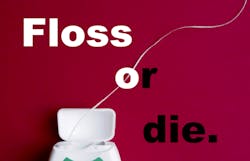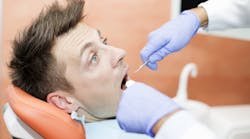Floss or die. We once thought 'stop smoking or die' was an exaggeration, didn't we?
What do you think when you hear the words 'floss or die'? Dr. Richard H. Nagelberg says those three little words carry lots of big assumptions with them. He goes on to discuss exactly what we know now about the way periodontal disease destroys gum tissue, and he plants seeds of things to be thinking about.
The three little words
floss or die
carry many assumptions with them.
These words assume that flossing really means overall home-care efforts. They also assume that those efforts—when practiced optimally—reduce the population of oral bacteria, which implies that pathogenic bacterial reduction is important for survival. This further implies that the bacteria themselves and the periodontitis they cause are involved at some level with cardiovascular health and other life-threateners.
There are many other assumptions implicit in the words floss or die. What do we really know at this point?
What we know—We know pretty well how periodontal disease happens. In a nutshell, destruction of gum tissue is initiated by bacterial lipopolysaccharides (LPS), but is kept going by the body. Periodontal pathogens produce enzymes that break down collagen in the extracellular matrix and the gingival cell membranes, which they eat.
The body responds with an immune-inflammatory response, including the release of enzymes and inflammatory mediators. The host enzymes break up collagen and periodontal tissue, creating pathways for white blood cells to access, engage, and stop the bacteria in their tracks. If this process is not intercepted, the junctional epithelium migrates toward the apex, osteoclasts join the party, and, in time, the tooth is on the bracket table.
◾️ MORE TO READ AND STUDY : Lies, damned lies, and statistics: The truth behind the importance of flossing
Keep up with the latest in
oral-systemic research
Click HERE to access all of the articles in DentistryIQ's popular blog, "Making the Oral-Systemic Connection," by Dr. Richard H. Nagelberg. Click HERE to write to Dr. Nagelberg about any topics you've read about in this blog or to submit items you'd like to see covered here.
What we don't know—At this point, however, we do not know the exact mechanism whereby all of this may contribute to the demise of an individual. There are a number of biologically plausible mechanisms that are being investigated. At some point, there will likely be a number of them, as is the case with many diseases and conditions that have multifactorial causes.
Something to think about—We do know that optimal home care reduces the oral bacterial population. We know that bacteria are the villains in the gum disease story. No one will argue that bacterial reduction does not create a healthy environment. Floss or die is an exaggeration at this point, but there was a time when stop smoking or die was also an exaggeration. Time will tell about flossing. But for now, this is something to think about.









